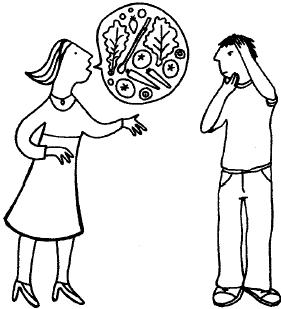
parting is easy but meeting is difficult
However good or bad we’re feeling inside, we still have to communicate with each other. We come out of our front door, see someone and adopt the public face. ‘How are you?’ ‘Awright, mate?’ we ask at home. Abroad, greetings seem somehow more exotic:
stonko? |
Muskogee (Oklahoma and Florida, USA) |
ah chop? |
Aramaic (Maaloula, Syria) |
oli? |
Koyo (Congo) |
hamjambo? |
Kiswahili (South East Africa) |
‘Fine, thanks!’ we reply. They say:
bare bra |
Norwegian |
dagu dad |
Adyghe (North Caucasus, Russia) |
bash |
Kurdi (Iran, Iraq) |
The Onge of the Andaman Islands don’t ask ‘How are you?’ but ‘How is your nose?’ The correct response is to reply that you are ‘heavy with odour’. Around the world there are numerous other ways to meet and greet:
cead mile failte (Irish) one hundred thousand welcomes
añjalikā (Pali, India) the raising of the hands as a sign of greeting
inga i moana (Gilbertese, Oceania) to greet with open arms but soon tire of
er-kas (Pahlavi, Iran) hands under the armpits in respectful salutation
abruzo (Latin American Spanish) the strong hug men give each other whenever they meet
lamuka usalali (Mambwe, Zambia) to greet somebody lying down on one’s back (a salute generally given to chiefs)
The Scots have a useful word, tartle, which means to hesitate in recognizing a person or thing, as happens when you are introducing someone whose name you can’t quite remember. They are not the only ones to suffer from this infuriating problem:
ciniweno (Bemba, Zambia) a thing, the name of which one does not remember
joca (Portuguese) thingumajig, thingumabob
That little dilemma solved, not everyone finds it easy to continue:
byatabyata (Tsonga, South Africa) to try to say something but fail for lack of words
vóvôhetâhtsenáotse (Cheyenne, USA) to prepare the mouth before speaking (for example, by moving or licking one’s lips)
dabodela (Malagasy, Madagascar) one in the habit of opening his mouth so as to show his tongue projecting and rolling a little beyond the teeth, and yet not able to speak
bunhan bunahan (Boro, India) to be about to speak and about not to speak
With others you sometimes wish they found self-expression harder:
láu táu (Vietnamese) to talk fast and thoughtlessly
hablar hasta por los codos (Spanish) to talk non-stop (literally, to talk even through the elbows)
mae hi’n siarad fel melin bupur (Welsh) she talks non-stop (literally, she talks like a pepper mill)
hinikiza (Swahili) to out-talk a person by making a noise
kumoo musu baa (Mandinka, West Africa) to jump into a conversation without knowing the background
nudnyi (Russian) someone who, when asked how they are, tells you in detail
chovochovo (Luvale, Zambia) the tendency to carry on talking after others have stopped
gnagsår i ørene (Norwegian) blisters in your ears: what someone who talks a lot gives you
First impressions are important, particularly to the people visiting a place for the first time. The name of the Canary Islands (Islands of the Dogs) derives from the wild dogs (canes) that barked savagely at the Romans when they first arrived on Gran Canaria.
Cities
Cuzco (Quechuan, Andes) navel of the earth
Khartoum (Arabic) elephant’s trunk
Topeka, Kansas (Sioux Indian) a good place to grow potatoes
Countries
Anguilla: from the Spanish for eel, so named by Columbus
due to its elongated shape
Cameroon: from the Portuguese Rio de Camarőes, River of
Shrimps
Faroe Islands: from the Faroese Føroyar, Sheep Islands
Barbados: from the name Os Barbados, the Bearded Ones:
the island’s fig trees sported long roots resembling beards
Advances in technology have ensured that we are always on call, but whether that improves the quality of our lives is somewhat debatable:
yuppienalle (Swedish) a mobile phone (literally, yuppie teddy: as they were like security blankets for yuppies when they first came out)

proverka sloukha (Russian) an expression used in telephone conversations, meaning ‘I have nothing special to say – I just called to say hello’ (literally, a hearing test)
telebabad (Tagalog, Philippines) talking on the phone for a long time
prozvonit (Czech and Slovak) to call someone’s mobile from your own to leave your number in their phone’s memory, without the intention of the other person picking up
Not that we should ever take communication of any kind for granted. At whatever pace, misunderstandings are all too easy:
geop (Gaelic) fast talk which is mostly unintelligible
beròhina (Malagasy, Madagascar) to be spoken to in a strange dialect, to be perplexed by hearing provincialisms
betenger (Manobo, Philippines) to speak another language with a pronunciation that reflects one’s own native language
tener papas en la boca (Chilean Spanish) to speak in a stuffy or incomprehensible manner (literally, to have potatoes in the mouth)
Those who learn languages other than their own will sometimes come across words which look or sound the same as English, but mean very different things:
dating (Tagalog, Philippines) arrival
phrase (French) sentence
dating (Chinese) to ask about, enquire
Handy (German) mobile phone
And sometimes people just speak rubbish anyway:
höpöhöpö (Finnish) nonsense
prietpraat (Dutch) twaddle
botalo (Russian) a chatterbox, a babbler (literally, a cowbell)
poyipoyi (Tsonga, South Africa) a person who talks at length but does not make sense
bablat (Hebrew) baloney (an acronym of Beelbool Beytseem Le-Io Takhleet: bothering someone’s testicles for no reason)
ich verstehe nur Wortsalat (German) I don’t understand a thing you are saying (literally, all I hear is the word sal1ad)

Information is power, they tell us; but finding out what we need to know isn’t always as straightforward as we’d like. Sometimes we have to adopt special methods:
candrānā (Hindi) to make an enquiry with a feigned air of ignorance
antsafa (Malagasy, Madagascar) enquiries about things of which one is fully cognisant beforehand
… although of course two can play at that game:
gadrii nombor shulen jongu (Tibetan) giving an answer that is unrelated to the question (literally, to give a green answer to a blue question)
kinkens (Scots) an evasive answer to an inquisitive child
iqsuktuq (Iñupiat, Inuit) to respond negatively by wrinkling the nose
So sometimes it’s ‘yes’…
mhm |
Lithuanian |
hooo |
Agua Caliente (California, USA) |
ow |
Amharic (Ethiopia) |
eeyee |
Setswana (Botswana) |
uh-uh-huh |
Tamashek (West Africa) |
… and other times ‘no’:
mmm |
Pulawat (Micronesia) |
uhuh |
Shimasiwa (Comoros, Indian Ocean) |
yox |
Azerbaijani |
bobo |
Bété (Cameroon) |
doo-yee |
Kato (California, USA) |
halo |
Chinook (North America) |
pepe |
Chitonga (Zambia) |
hindi |
Tagalog (Philippines) |
yuk |
Tatar (Russia) |
Just be sure you know which m(h)mm is which.
People fail to understand each other all the time it seems. The English idiom ‘it’s all Greek to me’ has counterparts through-out the languages of Europe. To the Germans it’s ‘Spanish’, to the Spanish and Hungarians it’s ‘Chinese’, to the French it’s ‘Hebrew’, to the Poles it’s ‘a Turkish sermon’. And, more unusually still, the Germans say
ich verstehe nur Bahnhof I only understand station